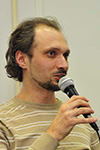Romashchuk, Alexander N.

Ph.D in Psychology
Ph.D in Psychology
Lomonosov Moscow State University
Moscow, Russia
-
The problem of the transition from “naive” to scientific concepts: conceptual change approach and Vygotsky's cognitive development theoryLomonosov Psychology Journal, 2021, 3. p. 239-259read more3108
-
The relevance of the paper — discussing an area of modern cognitive psychology, namely, conceptual change approach. It examines the origins of this approach: 1) the transition from «naïve» to «scientific» thinking in children as an applied task of primary and secondary school education; 2) the basic concepts and theoretical principles of this approach, such as «domain specificity» and «misconception».
The goal. The study emphasizes the problems of implementation and theoretical analysis of the transition from one type of thinking to another, which the representatives of conceptual change approach/theory are faced with.
Methods. The analysis of the «naive» concepts as integral systems («everyday theories») allows us to highlight the fundamental difference between the two strategies of analyzing the transition to scientific concepts described by L.Vygotsky.
Results and conclusions. According to the first strategy, the scientific concepts supplant the everyday ones; the forms of everyday thinking (such as game) can be used to maintain weak original forms of scientific concepts. The opposite strategy, especially emphathized by L.Vygotsky, regards the process as not just a substitution, but a specific transformation of everyday theory. The closest approach to such transformation understanding is Elkonin-Davydov developmental education theory, which, nevertheless, implements this logic in a contradictory manner.
Keywords: conceptual change; conceptual change; scientific thinking; naive concepts; scientific concepts; naive theories; developmental education DOI: 10.11621/vsp.2021.03.12
-
-
A.N. Leontiev’s activity theory and the overcoming of double-factorial determination of psychic.Lomonosov Psychology Journal, 2013, 2. p. 26-39read more21478
-
It is commonly accepted that the theory of activity by A.N. Leontiev was the attempt to overcome so called “word-centrism” developed by L.S. Vygotsky. At the same time there are some arguments, that theory of activity was developed to solve the problem, which had been formulated by Vygotsky. He tried to overcome double-factorial determination of psychic, i.e. to go from social to psychological determination. To solve the problem Vygotsky modified his own theory and changed the main concept from high mental function to system structure of conciseness and interfunctional interactions. Vygotsky suggested emotional experience as the unit of psychic. Group of psychologists worked in Kharkov tried to solve this problem in another way. They supposed that activity mediates as social, as physiological factors. This decision was more materialistic from their point of view. Reveling the real basic theoretical problem of theory of activity is important for understanding its main statements and experimental results. Analysis of investigations, conducted by the adepts of the theory of activity, leads to understanding of holistic nature of activity.
Keywords: A.N. Leontiev’s psychological theory of activity; cultural-historical theory by LS. Vygotsky
-









